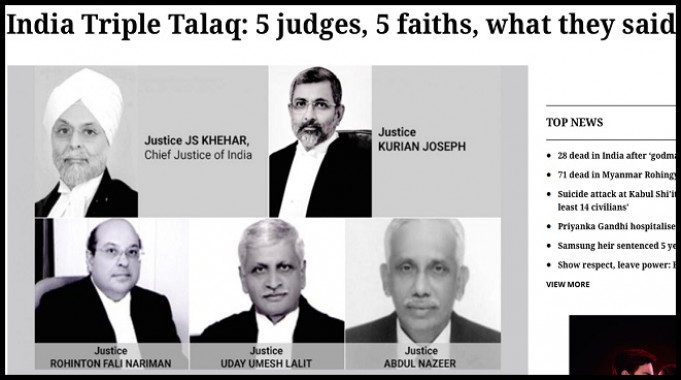Muslim countries’ verdict on triple talaq ruling
The Daily Star report
A day after India’s Supreme Court invalidated instant triple talaq, the Khaleej Times of the UAE pointed out that at least 19 countries, including the UAE, “have enacted laws to deal with 'talaq-e-biddat' (instant triple talaq).” Pakistan’s Dawn, The Nation, and Daily Times also noted that India’s neighbours have already banned it.
Another point that caught the attention of the media in the sub-continent and West Asia was the multi-religious composition of the Supreme Court’s bench. The Daily Star published a separate news item on the bench’s composition. Several Pakistani English dailies (Dawn, The Express Tribune, The Nation, The News, and Daily Times), Khaleej Times, Al Arabiya (online news portal/The UAE), and Hurriyet Daily News (Turkey) also highlighted this fact.
However, Dawn and other newspapers added that “Modi's ruling Bharatiya Janata Party has long pushed for a uniform civil code, governing Indians of all religions.” They added that the General Secretary of the All India Muslim Personal Law Board claimed that this issue “was made into a media campaign to malign the image of Muslims.”
All these newspapers also mentioned the names of a few victims of triple talaq, including Shayara Bano, who fought the case in the Supreme Court. Khaleej Times published a photograph of a victim and also published two letters to the editor written by women that welcomed the court’s decision.
The coverage of the issue in the news media of Islamic majority countries in India’s neighbourhood highlighted three key aspects. First, the newspapers indirectly pointed out that India has belatedly decided to reform this controversial practice that has already been banned in much of the Islamic world.
Second, they highlighted the inclusive, multi-faith nature of the Indian judiciary. Most of them characterised India as a secular country, but also noted that a Hindu nationalist party was in power and that the issue of triple talaq is linked to the proposed uniform civil code.
Third, they gave a human face to the problem of triple talaq by including the perspective of victims in their coverage. However, Al Jazeera did not note the multi-faith composition of the bench and it also did not cover victims’ responses to the ruling in its otherwise extensive coverage.
Apart from the Khaleej Times which alone covered the issue on its first page, The Daily Times and Al Jazeera provided significant space to the subject. Unlike other newspapers that only referred to the responses of Prime Minister Narendra Modi and the All India Muslim Personal Law Board, the Daily Star also noted that the Board, along with the All India Shia Personal Law Board, called it “a victory of Islam and Muslim women in the country.” But The Daily Star was also the only one to publish a photograph of women protesting against interference in Muslim Personal Law.
Al Jazeera updated and published an old news item that reported different perspectives on triple talaq. This item criticised the survey conducted by the Bharatiya Muslim Mahila Andolan (a petitioner in the case) for not disclosing its survey methodology, but did not raise similar questions while quoting Faizan Mustafa, Vice Chancellor of NALSAR University of Law in Hyderabad who claimed that “Out of 4,710 people, 525 divorces took place. Out of this only one divorce was by SMS. Therefore, they have played it out of proportion. Media has further portrayed as if every Muslim is divorcing through SMS.”
Also, Al Jazeera only briefly covered the response of those supportive of judicial intervention in this matter. Yet it published a standalone interview with Faizan Mustafa who suggested that “Court judgments do not bring about social reforms. “Now the only thing is if a Muslim male does triple talaq and if the wife goes to the court, the court won't recognise the divorce. Now, will the girl go back [into the marriage]?” asked Mustafa. He added that “Marriage is a relationship of love; the courts cannot force you to love each other. That's why I say, in these matters courts have a limited role.”
Al Jazeera was silent on whether Qatar has banned the practice, even though it pointed out that the practice is banned in several Muslim countries including Pakistan.
To conclude, the Indian Supreme Court’s decision on triple talaq attracted attention in India’s extended neighborhood, where several newspapers published news items based on AFP and other sources. The Daily Star carried a report by its own correspondent as well. Most newspapers implicitly noted that the measure was long overdue, but also seem to mute their recognition of the historic character of the decision in light of the political party in power.
Ankita Pandey is an independent researcher based in Bengaluru
